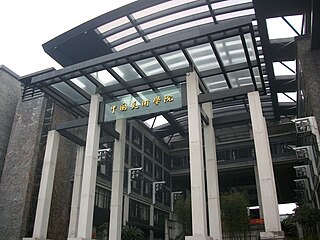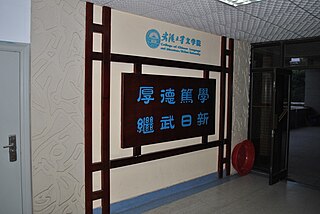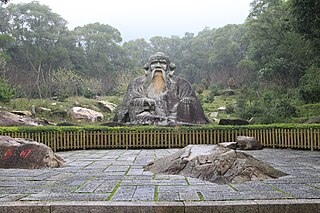
Tsinghua University is a major research university in Beijing, and a member of the elite C9 League of Chinese universities. Since its establishment in 1911, it has graduated numerous Chinese leaders in politics, business, academia, and culture.
The University of Nanking, known in Chinese as Jinling University was a private university in Nanking, China. The University of Nanking was founded in 1888 and sponsored by American churches. Its original English name was Nanking University, the first educational institution in China officially named "university" in English.

Sichuan University is a university in Chengdu, the capital of Sichuan Province, China. It has a long history and many predecessors, of which the earliest one was founded in 1740 with the origin in BCE 141. It was transformed to be a modern university in 1920s and the name National Sichuan University (國立四川大學) was adopted in 1931.

China Academy of Art, also translated as China National Academy of Fine Arts, is a fine arts college under the direct charge of the Ministry of Culture of China. It was founded in Hangzhou in 1928 by the government of the Republic of China and the renowned educator Cai Yuanpei. It was the first art university and first graduate school in Chinese history. It is a Chinese Ministry of Education Double First Class Discipline University, with Double First Class status in certain disciplines.

Nanjing Normal University is a normal university in Nanjing, Jiangsu province, China. Located in the ancient capital of six dynasties in Chinese history, Nanjing Normal University is one of the national key universities of "Project 211" under the supervision of the Ministry of Education and Jiangsu Provincial Government. It is a Chinese Ministry of Education Double First Class Discipline University, with Double First Class status in certain disciplines. The International Research And Training Centre For Rural Education is affiliated with the university's Education Faculty.

Zheng Zhenduo, courtesy name Xidi, was a Chinese journalist, writer, archaeologist and scholar. His pen names were Baofun (寶芬), Guo Yuanxin (郭源新) and CT.

Wuhan University is in Wuhan, Hubei. It is one of the most prestigious and selective universities in China, which has been selected as a Chinese Ministry of Education Class A Double First Class University. It was one of the four elite universities in the republican period and also one of the oldest universities in China. In 1948, University of Oxford in the United Kingdom wrote to the Ministry of Education in China, confirming that undergraduate students at Wuhan University with degrees in liberal art and science, who had an average grade above 80 would be awarded "the senior status of Oxford". Wuhan university is located at Luojia Hill, with palatial buildings blending Chinese and Western styles. It is regarded by many as one of the most beautiful campuses in China.
Jinan dialect is a Mandarin Chinese dialect spoken in Jinan in Shandong province.
School of Aeronautics and Astronautics (SAA) of Zhejiang University, is one of the university schools/colleges primarily focuses on space technology in the People's Republic of China.

Nanjing Forestry University(NFU or NJFU, simplified Chinese: 南京林业大学; traditional Chinese: 南京林業大學; pinyin: Nánjīng Línyè Dàxué. Chinese abbr. 南林大 or 南林) is an institution of higher learning in Nanjing, China. It is jointly run and administered by central government of Jiangsu Provincial Government. It is a Chinese Ministry of Education Double First Class Discipline University, with Double First Class status in certain disciplines.
Tatsuo Nishida was a professor at Kyoto University. His work encompasses research on a variety of Tibeto-Burman languages, he made great contributions in particular to the deciphering of the Tangut language.

Hubei Institute of Fine Arts is an art college in the People's Republic of China (PRC). It is regarded as one of the best and most selective academies of fine arts in China. Its history dates back to 1920, making it the first private art school in modern China. As one of the three oldest art colleges, it is also one of the cradles of higher education of fine arts in modern China. It is located in Hubei Province's capital Wuhan, known as "the thoroughfare leading to nine provinces". Located in Wuhan, the industrial, economic and cultural center of central China, Hubei Institute of Fine Arts is widely regarded as a top academy of multiple disciplines, including watercolor painting, Chinese painting, oil painting, mural painting, mixed media painting, printmaking, sculpture, etc. HIFA has two campuses and covers more than 488,000 square meters, which hold more than 500 faculty and staff members and more than 7,000 students.
Nanjing University Medical School, the Medical School of Nanjing University, is one of the major practical and professional schools of Nanjing University. The division of basic medicine is located in Xianlin campus, and division of clinical medicine in Gulou campus which is located in the centre of Nanjing.

Wuhan University College of Chinese Language and Literature is a school that awards undergraduate and graduate degrees with majors related to Chinese language and literature. Established by Wuhan University in 1917, the college is categorized under the Faculty of Humanities. The dean is Xianfeng Tu. The college was ranked among the top ten in a survey conducted by the Ministry of Education of China.

The College of Foreign Languages and Literature at National Chengchi University (NCCU) was established in 1989. The college was detached from the "College of Liberal Arts" in 1989. NCCU CFLL is the first public college of foreign languages and literature established and also regarded nationally as one of the best CFLL in Taiwan.

PLA Nanjing Political College is a state university administered by the People's Liberation Army General Political Department of the People's Republic of China. The university is located in Gulou District of Nanjing, Jiangsu province. The university is a member of Project 211. The university has 2 campuses.
I Lo-fen is a Taiwanese scholar and writer. She received her Chinese Literature Ph.D. from National Taiwan University. She has been an associate professor in the Division of Chinese in Nanyang Technological University’s School of Humanities and Social Sciences since July 2006, and was the Head of the Division (2014-2016). She founded "Text and Image Studies Society"(文图学会) which was official registered in Singapore on 18 December 2017. She is also a column writer of Singapore Lianhe Zaobao (2007-), and had formerly committed in institutes like the National Taiwan University, Tamkang University, Fu Jen Catholic University, and the Institute of Chinese Literature and Philosophy at Academia Sinica. In addition, she was also a visiting professor in the East Asian Institute at Sungkyunkwan University, South Korea. Her research interests include the relationship between Chinese poetry and visual art, interchange of East-Asian culture and classical Chinese literature, and Su Shi studies. By integrating the history of Chinese literature and arts, she has accomplished a series of researches on poems in paintings and poetic imagery. She then proposed the idea of the “Text and Image Studies”(文图学) and focused on the relations, comparison and intertextuality between poems and paintings. From there, she has established her literary theory in arts creation and culture of aesthetics.

Minnan culture or Hokkien/Hoklo culture, also considered as the Mainstream Southern Min Culture, refers to the culture of the Hoklo people, a group of Han Chinese people who have historically been the dominant demographic in the province of Fujian in Southern China, Taiwan, Singapore, and certain overseas Chinese communities in Southeast Asia.
The private Jiangnan University, was founded in Wuxi in 1947 by Rong Desheng, the largest national capitalist in the Republic of China era.













